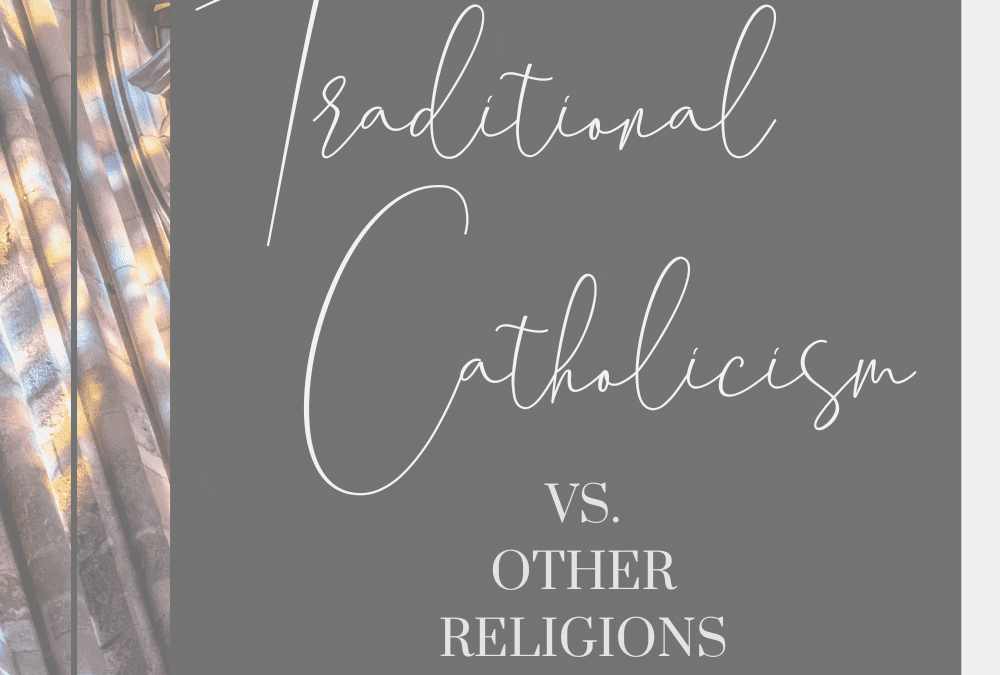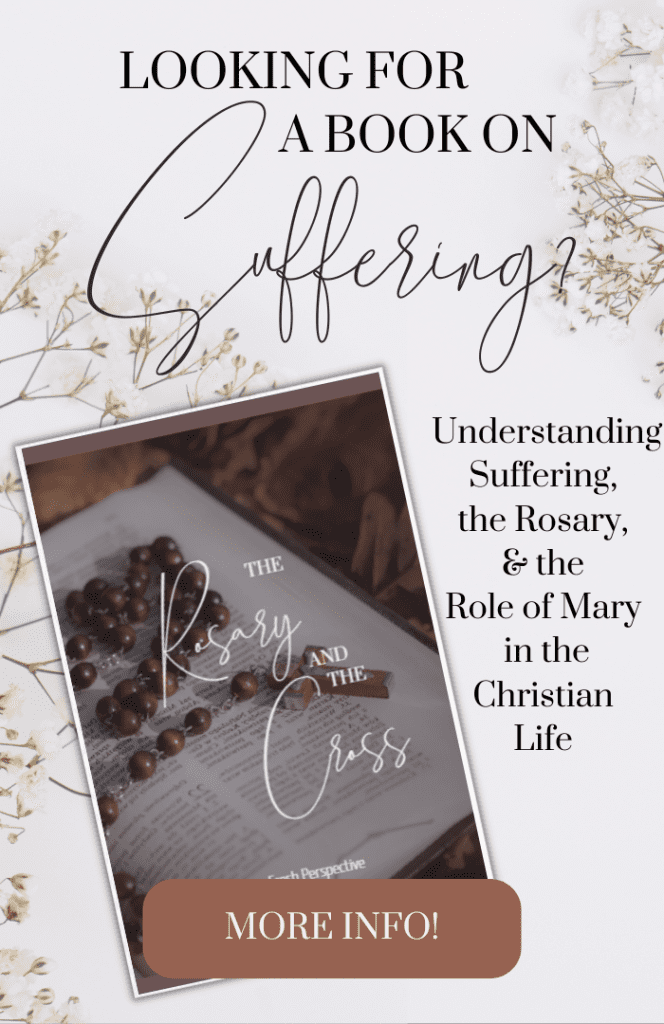What is the Difference between Traditional Catholicism & Other Religions? This question has been asked a thousand times and there are many different correct answers. There are some who believe that the point is mute and that the Religion you profess doesn’t really matter (Relativism). But, for the educated, Bible-following Christian, not only is this perspective illogical, but it also contradicts the Bible itself. Since you are here, you likely already have your doubts on that anyway.
Is Catholicism evil?
On the complete opposite end of the spectrum, there are many who would suggest that Catholicism is evil, “the whore of Babylon”, and that all her adherents are bound for Hell.
This latter theory is held mostly because of the great hatred for Catholicism spread during the time of the Protestant Revolt of the early 1500s. This hatred was immortalized in writings and art and proliferated into the modern era by organizations such as the Klu Klux Klan and subsequently adopted by many Protestant denominations.
Most denominations may not be able to tell you why or what exactly terrifies them about Catholicism, they just “know” to stay as far away as possible, even if that means embracing Relativism as their typical worldview, as long as it doesn’t extend to those “women hating”, yet “Mary worshipping”, idolaters.
Catholics trying to be less unique?
Catholics have long been aware of these prejudicial fears and “cited” them as one of the excuses in modern times for doing away with most of the ancient practices that had been developed and held for millennia. Post 1965 Catholicism looks very different from the ancient Faith. in theory, this was done (among other things) to diminish the “barrier” between Catholicism and our “protestant brethren”, in the hopes that more of them might be less afraid of joining the Faith.
Hence the blurred line that makes so many ask the question in the first place:
What indeed IS the difference between traditional Catholicism and all other Religions?
These changes, however, did not help to diminish the divide, at least on the part of those extremely prejudiced against all things Catholic, but instead created an explosively fertile breeding ground for the growth of Relativism, and blurred the lines to the point where even most Catholics no longer know what makes their beliefs distinct or even worth holding.
What indeed IS the difference between traditional Catholicism and all other Religions?
#1 – Practices?
Some may think, the difference is about the ancient “pharisaical” practices – all the external, ritualistic rigors/”bells-and-whistles” so characteristic of the common mental image of “Traditional Catholicism”. Of course, those certainly do set Traditional Catholicism apart, but they only exist for a purpose, and not as ends in themselves. (See article: What’s the point of the bells and whistles of Trad Catholicism?)
So, what else then? There has to be a better answer to the question…
#2 – The Eucharist
15 years ago I myself believed the common story proclaimed by most modern Catholics that “nothing changed” with the modernization of the Church at Vatican II except the language, and I firmly believed what I had been told, that the only real difference between Catholicism and any other religion was the Real Presence of Jesus Christ in the Eucharist. However, even this truth is doubted by a large percentage of the Catholic population, especially among those who do not actively practice their faith. (See article).
Since, this fact is so largely unknown and even disbelieved, then maybe it is still not the top reason to explain the fundamental difference between Catholicism and other religions.
#3 – Authority
Fr. Mike Schmitz does a video on this topic and cites his major reasoning to explain the difference between Catholicism and other Religions as “Authority”. He explains how the hierarchical structure of the Catholic Church helps to provide for unity in her ranks. The name Catholic means “Universal”. Without the hierarchical authority structure of the Church, any attempt at unity would be impossible. With anyone and everyone being able to do and or believe anything any way they wanted, there would essentially be as many different religions as parishes. (Much like the structure of most modern Protestant churches…) This would also provide for Relativism to be an acceptable system of belief.
However, it is irrational to believe that the unchanging God who is the same yesterday, today and forever (Hebrews 13:8) could possibly be truly understood or known in so many conflicting lights. Someone has to be wrong, but how can we possibly know who or what without some authority structure to guide correct and confident understanding?
Problems with this point?
While this point is certainly true and valuable, there is still a great deal of argument about whether this point poses more problems than it solves for those looking for a difference that isn’t so controversial. Some believe that the Church hierarchy/authority structure (ie. Rules and regulations) makes it too oppressive, rigid, unfeeling, unwelcoming, and unloving. They also often see it as a display of “masculine superiority “, or as a “debasement/lack of inclusion of women”. While there are certainly responses to these concerns, (see below note), such a controversial and advanced topic still doesn’t seem to provide a happy, simple answer to our question.
A Quick Side-Note on Authority*
Most people think that the term “authority” refers to the people in authority within the Church, (ie. The current pope/bishop/priest), but this is actually a misunderstanding. What we are referring to is actually an Authority of the “Church” as handed down to us from those who lived and died for this protection and understanding of fundamental truths for centuries, even millennia. These fundamental truths have been challenged, explored, hashed out, argued, and settled (usually by miracles and martyrdom) for hundreds of years. Nothing is arbitrary in the authority structure of the Church. It is interesting to note that the current people “in authority”, are actually subject to the established and handed down Authority (capital “A”) of the centuries. Anyone who does not choose to not abide by these time tested truths and practices is not truly being Catholic (ie, Universal – in the literal understanding) but instead, quite literally “Protestant”, (meaning, protesting an established Truth handed down through the ages).
# 4 – History
This leads us to the next point. The long standing history and tradition of the Church. No other institution can boast being able to trace its roots all the way back to the apostles themselves, no matter how rocky that path may have been. No other institution has endured such persecution, or such ancient trials and afflictions (including heretical popes) and survived to tell the tale. It is clearly a testament to the words of our Lord Himself that “the gates of hell shall not prevail against it”.
But, again, this argument may seem biased or worthy of argument by many (another topic for another time), so it still does not seem to offer a happy, succinct answer to our question.
# 5 – Grace
We could go into the Catholic understanding of grace. However, it would be my guess that less Catholics know about this than Transubstantiation (See #2 above), and even less know how to harness, or use it.
In short, Catholicism understands grace like an athlete understands breathing. The Catholic who understands their Faith and Relationship with God believes that we are largely in “control” of how much grace we have, use, or cooperate with at any one time (since grace proceeds from specific designated “sources“). The Protestant understanding of grace is more like a random blessing, or sign of favor, forebearance, or forgiveness from God. Ie, we get it when we need it, usually, but sometimes we don’t. After all, “Who can possibly know the will of God?”
The Catholic understanding of grace is that grace is that Divine Life, the Divine Strength that flows from Abiding in the Vine, and we can quite tangibly grow our understanding of and capacity for that grace with practice and tap into it as needed, to accomplish (with Christ, of course) the otherwise “impossible” scenarios and challenges of everyday life.
#6 – Suffering
But even the understanding of grace is not sufficient, although it gets closer to the mark. There is still another major difference between Catholicism and all other religions. In my mind, this is the most overlooked and most instantly applicable and attractive difference between Catholicism and any other religion. It is the one that no one thinks about and very few truly understand, but if they did, it would change all our lives as we know them.
Brian Fisher from Soil and Roots says he is convinced that somehow “suffering is the key to everything“, but he hasn’t quite figured it out.
Well, he is right. Suffering is the key to everything. We all suffer. This life is hard and relationships are painful. Perseverance most days is neigh impossible. Catholicism is the only faith that actually explains suffering and gives it meaning and purpose. Granted, with the veritable stripping of 90% of what made Catholicism unique since Vatican II, most Catholics have also lost this understanding. (It is certain, however, that the understanding was being lost long before Vatican II. In fact, this loss likely explains why the changes proposed by Vatican II were ever permitted to take effect in the first place.)
The incredible suffering experienced in WWII caused a dramatic impact on the faith of the people. Essentially, we could not explain away nor cope with the intensity of the suffering on our own, therefore, we blamed it on a Religion that did not “fix our problems”. We wanted God to make everything better and to take away the pain…. But, He “did not answer our prayers”. Catholics began to search and long for the explanation of a God who desired our earthly happiness and did miracles at our bidding, rather than a God who transformed and leveraged suffering (as opposed to eliminating it).
Yes, in the Gospels there were times when Christ healed the sick and took away sadness, sorrow, and pain, but this was all to show His power as God. We conveniently forget that He also said, “he who is not willing to pick up his cross is not worthy of Me” (Matthew 10:38) or “the servant must go where the master leads”, “there is no servant greater than his Master” (John 13:16), “you will drink the cup” (Mark 10:39), and “If they persecuted Me, they will persecute you also (John 15:20)”. If we are so called to be true disciples, to “deep discipleship” as Brian Fisher calls it. We are called to follow Christ to Calvary and beyond, to imitate Him in the shedding of our blood out of love for God and our fellows.
But Catholicism doesn’t just “tell us to suffer”…
…it doesn’t intentionally “make our lives miserable with all its rules and regulations” so that we can suffer more. No, it doesn’t create suffering. Rather, it gives our pain an outlet, a way to diffuse its power over us, a mental framework for how to process and deal with it, purpose, meaning, intention, AND the grace to carry it.
Suddenly, everything makes sense. Suddenly, suffering is no longer a “problem“, but actually the answer! The blood of the Lamb baptized and transformed suffering in His sacrifice on the Cross. All the Protestant searching for depth and meaning finds its answer, not in something newly discovered or concocted, but in the Truth that has existed since the God of the Universe created Religion and raised up generations of heroes and martyr saints to teach us without a doubt that it is possible to maintain Christian joy even in the middle of this world of pain.
To me, this is the most essential and overlooked difference between Traditional Catholicism and any other Religion. It has the most instant practical application to our everyday lives and answers the deepest question of the human heart when it comes to Religion.


